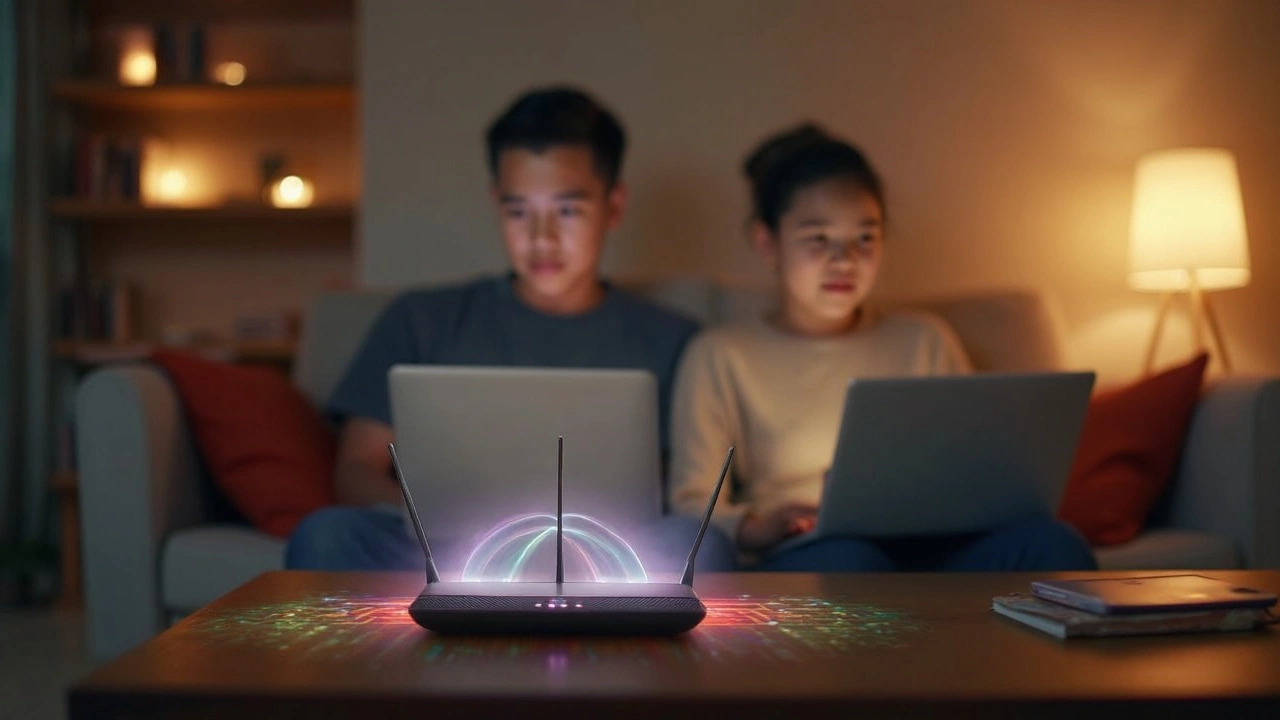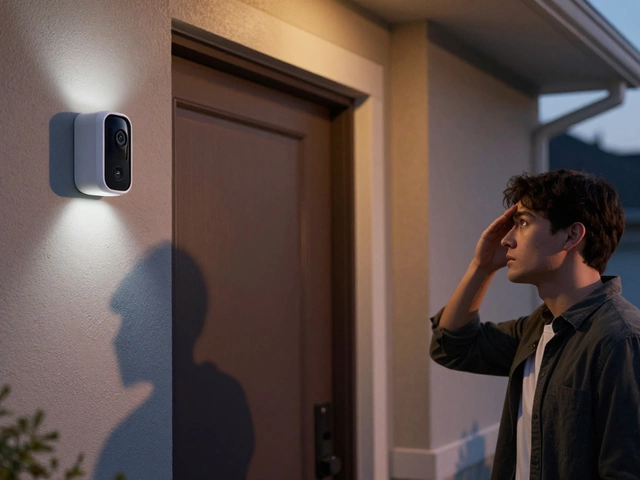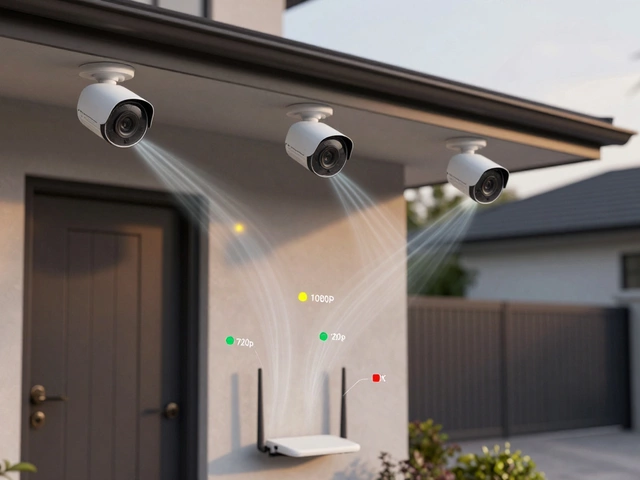Ever wondered if your WiFi CCTV setup is secretly munching away on your internet speed? You're not alone. With the rise of smart home security systems, this has become a hot topic. Here's the deal: WiFi CCTV cameras need internet to work, but how much they affect your speed depends on a bunch of factors.
First off, let's talk bandwidth. Each camera in your system is using a chunk of it to stream video and send alerts. The more cameras you have and the higher their video quality, the more internet they use. It's kinda like having extra people watching Netflix in HD while you're trying to get some work done.
Not all internet connections are created equal. If you're rocking a speedy fiber-optic connection, you might not notice the drag. But if your setup is more like a turtle on a leisurely walk, every bit of bandwidth used can slow you down.
But don't worry! There are ways to keep your internet speed zippy while keeping an eye on things. We’ll dive into some tips and tricks in this article, helping you find that sweet spot between home security and seamless surfing.
- The Basics of WiFi CCTV
- How WiFi CCTV Uses Your Internet
- Common Speed Concerns
- Tips to Minimize Internet Slowdown
- Choosing the Right Equipment
- When to Call a Professional
The Basics of WiFi CCTV
Welcome to the world of WiFi CCTV. So, what is it exactly? These are security cameras that use a wireless connection to send and receive data over your home network rather than through traditional cables. Pretty cool, right? This makes them super convenient for modern homes where drilling holes for cables isn't always practical.
One of the big draws of wireless CCTV is flexibility. You can place your cameras pretty much wherever you have a WiFi signal, like the front porch or back yard, without worrying about running a bunch of cables. Just keep an eye on that signal strength; a weak WiFi signal can mess things up.
How Do They Work?
Each wireless camera connects to your home WiFi network, streaming video to your recording device or cloud storage. This means you can view live footage on your smartphone, tablet, or computer with just a few taps. It's like having a mini security guard in your pocket!
The recordings are stored digitally, either on a local drive or in the cloud. This offers peace of mind since you can access past recordings anywhere, anytime—no more struggling with old-school tape systems.
Common Features
- Most WiFi CCTV cameras come with HD video quality, night vision, and motion detection. These features help ensure you don’t miss anything important.
- Two-way audio allows you to hear and speak through the camera, which is great for telling your dog Rex to get off the couch when you're not home.
- Now, smart integration is a thing. Connect your cameras with smart home systems like Google Home or Amazon Alexa, and you've got yourself a seriously high-tech setup.
A stat to chew on: according to a 2023 survey, over 60% of new home security installations are wireless. That's quite the leap, showing how people are leaning heavily into this tech.
Remember, while WiFi cameras are awesome, they're as good as your network. If your internet is slow or unstable, it won’t matter if you have the fanciest camera out there. But fear not! We’ll get into tips later in this article to help keep things running smoothly.
How WiFi CCTV Uses Your Internet
Okay, so you’ve got your WiFi CCTV cameras set up, and now you're wondering how they are using your internet. Let’s break it down. These cameras work by connecting to your home WiFi network to send video to the cloud or your phone. This means they're sipping from your internet’s juice box all day.
Data Streaming and Upload
When you think about data from a wireless CCTV kit, picture it like a steady stream flowing up your internet connection to the cloud. Depending on your settings, this stream consists of live footage, motion-triggered recordings, and sometimes even sound. The higher the resolution, the more data needs to be uploaded. HD and Full HD cameras typically use about 1-4 Mbps when actively streaming. Multiply that by multiple cameras, and you’ll start noticing.
Bandwidth Usage
Bandwidth is your internet's capacity to carry data, and it's important to consider how much of it your cameras occupy. If you’re on a limited data plan, it's something to watch out for. Constant streaming can eat into bandwidth fast, especially with higher video quality settings. To save some of that precious bandwidth, schedule uploads during off-peak hours or adjust the video settings to a lower resolution.
Table Example - Data Usage by Camera Quality
| Quality | Data Usage |
|---|---|
| Standard Definition | 0.5-1 Mbps |
| High Definition | 1-2 Mbps |
| Full High Definition | 3-4 Mbps |
Keeping tabs on these numbers helps ensure that your internet speed remains adequate for other devices and activities in your home.
Impact on Connected Devices
While your WiFi CCTV is doing its thing, other connected devices might feel the squeeze if your internet speed isn't up to snuff. Lag in online gaming, video call interruptions, or slow page loads could be signs that your CCTV cameras are hogging the bandwidth.
Ultimately, effective management and knowing these details can ease the pressure on your network. A decent router and a good internet service package can make all the difference for a seamless experience.
Common Speed Concerns
So, what's the deal with WiFi CCTV and internet speed? It's all about how much data your cameras are gobbling up. Think about it—each time your camera streams video, it’s using a chunk of your bandwidth. This can start to add up, especially if you're sporting a whole fleet of cameras.
Now, let's chat about video quality. The higher the quality, the more data each stream needs. While HD or 4K cameras provide crystal-clear images, they're also notorious for being data hogs. If you're noticing a slowdown, it might be worth checking if your cameras are set to max resolution.
Simultaneous Streaming Woes
Another issue kicks in when multiple devices are connected to your network. Your smart TVs, tablets, phones, and wireless CCTV kit all want a slice of the bandwidth pie. If everyone's watching videos or playing games, it can seriously crunch your speeds. A crowded network might be the culprit if your internet's moving slower than a lazy Sunday.
The Router's Role
Your router acts like the traffic cop for your home network. If it's an old or basic model, it might struggle to handle multiple connections efficiently. Upgrading to a more robust router can make a big difference.
ISP Limits and Bandwidth Caps
Let's not forget the role of your Internet Service Provider (ISP). Some plans come with limitations like data caps or throttling, which can hit your performance. For instance, if you exceed a certain data threshold, your ISP might slow your connection speed. It's worth checking the fine print of your internet plan.
Network Interference
Finally, interference can also mess with your speeds. Cordless phones, microwaves, and other electronics can interfere with WiFi signals, which might affect your WiFi CCTV and overall internet performance.
By understanding these factors, you can start tweaking your setup to optimize both security and surfing. Keep reading for tips on solving these issues!

Tips to Minimize Internet Slowdown
So, you're juggling between keeping your home secure with WiFi CCTV cameras and wanting top-notch internet speed? Here are practical ways to find that balance without sacrificing either.
Adjust Video Quality
It's tempting to set your cameras to stream in HD, but that gobbles up bandwidth like there's no tomorrow. Consider lowering the video quality on less crucial cameras. It's like trading a portrait for a thumbnail – still visible, but less demanding.
Schedule Recording Times
Not every second needs to be recorded. Set your system to record only during certain hours or when there's movement. This not only saves bandwidth but also makes reviewing footage way easier.
Upgrade Your Router
Sometimes, the culprit is an old or weak router that can't juggle all your online needs efficiently. Getting a new one with dual-band channels or WiFi 6 technology can mean a world of difference.
- Dual-band routers offer 2.4 GHz and 5 GHz channels, which lets you separate devices based on their needs.
- WiFi 6 is faster and can handle more devices.
Separate Networks
If your internet allows, create a separate network exclusively for your wireless CCTV kit. This isolates its usage and prevents interference with your regular internet activities.
Monitor Usage
Keep an eye on your network’s performance. Many modern routers show which devices use the most bandwidth. Use this info to adjust settings or spot any unwelcome bandwidth hogs.
Use a Wired Connection for Critical Cameras
Super important areas? Consider switching to an Ethernet connection. It might mean a bit of extra effort with cables, but it takes the load off your WiFi.
Here's a glimpse of how each adjustment can impact:
| Tip | Bandwidth Saved |
|---|---|
| Lower Video Quality | Up to 50% |
| Schedule Recording | Up to 40% |
| Wired Connection | Depends on usage |
Combining these strategies helps you enjoy both a secure home and a smooth internet experience. Each home is different, so play around and see what yields the best results for your setup!
Choosing the Right Equipment
Alright, let's talk gear. If you're looking at setting up WiFi CCTV in your home, picking the right equipment is key. Not all gear is gonna work well with every setup, so here's what you need to know before making a decision.
1. Camera Resolution and Quality
High-resolution cameras are great for clear images, but they use more bandwidth. You might want 1080p or even 4K for crucial areas. Just remember, better quality means more data. Do a quick check on how much your internet can handle first.
2. Router Compatibility
Your router is the backbone of your internet connection. Ensure it's up to date and supports the number of devices you plan to connect. Dual-band routers, which work on both 2.4GHz and 5GHz, are handy because they help distribute the load better.
3. Data Storage Solutions
Decide where you're going to store your video footage. Some people prefer local storage like DVRs or NVRs, which won't impact your internet speed. Others go for cloud storage, which can affect bandwidth if it's constantly uploading data.
4. Wireless CCTV Kit Options
There's a ton of wireless CCTV kits out there with different features. Look for ones with good user reviews, easy installation, and reliable connectivity. Don't just go for the cheapest option; you often get what you pay for in terms of quality and reliability.
5. Tech Support and Updates
Buying from a brand that offers solid customer support and regular firmware updates can save you a headache in the long run. Security threats evolve, and keeping your system updated is essential.
Getting the right gear can make your home security system run smoothly without turning your internet into a snail. Check out the specs, compare a few options, and keep these tips in mind to find the best fit for your needs.
When to Call a Professional
So, you've done your best with your WiFi CCTV setup, but things still aren't clicking as they should. Before you throw in the towel, here's when you might really want to think about calling in the pros.
Constant Connectivity Issues
If your cameras keep disconnecting or you're constantly seeing buffering instead of live footage, it might be more than just a weak signal. Sometimes, interference from other devices or incorrect placement can mess things up. Professionals can assess and optimize your setup for the best performance.
Complicated Installations
When you're dealing with a large property or want to integrate your wireless CCTV kit with other smart home devices, things can get tricky. A professional can handle complex wiring or advanced system configurations that might make your head spin.
Security Concerns
Your home security should be rock solid, right? If you're worried about whether your network is properly secured against intruders, experts can ensure that your system's security settings are up to par. They can help set up strong passwords, firewall protections, and encrypted connections.
Slow Internet and Unsolved Mysteries
If you've tried all the DIY fixes and your internet speed is still taking a hit, a professional may spot something you've overlooked. It could be issues like bandwidth mismanagement or router settings that need a little tweaking.
Bringing in the professionals isn't a sign of defeat—it's a smart move when you've hit a wall. You'll save yourself the headache and potentially costly errors while ensuring your home surveillance is up and running at its best.



